Hannah, England, studying GCSEs Main blog: @bubblegumbesos
Don't wanna be here? Send us removal request.
Text
Polyglot Diary Ideas
I recently saw a post (sorry I don’t have your @) about what a good idea it is to keep a diary in your target language. It will help you realize what words you don’t know, you need, and want to learn! Plus it’s great practice!
So I thought I’d drop some ideas/prompts for you to try once a day, or at your own pace.
Keys
Underline words you use often, so you can later look up synonyms!
Write words you aren’t sure you’re using correctly in a different color.
Put a * next to words you’re having trouble memorizing, and put definitions of that word at the bottom of the page.
Prompts
Introduce yourself!
Introduce your family.
How many siblings do you have?
What are they like? (Try to use at least three adjectives!)
What do you like to do?
What are your favorite foods?
When you go to a restaurant, what do you like to order?
What year are you in school?
What subjects did you take in school?
What is your favorite season?
Why is it your favorite?
What don’t you like?
Say something about one of your friends! (Try to use at least three adjectives!)
Name a memory with your friend.
What’s your favorite color/animal?
Introduce your pets!
What are they like?
Name a memory with your family!
What is your favorite thing to wear?
What is your favorite type of weather?
What is your favorite holiday?
What do you look like?
Where do you work?
What do you do there?
What did you have for dinner last night? Who was there?
What is your favorite book/show/movie?
What’s it about?
Recite a poem or quote in your target language!
What is your house like? (Ex: My house is small. / I have a brown couch.)
How are you feeling?
What was the last thing you read/watched?
How was it?
What was the last thing you read/watched in your target language?
Do you have any hobbies? (Ex: sports, knitting)
Who did you last see?
What did you guys do?
Where is the last place you went?
How was your day?
Who is your favorite celebrity?
Describe something you saw today.
What did you do yesterday/last week?
What do you hope to do in the future? (Ex: “There’s a concert next week..”)
This is all I can come up with for now, but remember! You do it how you want to do it! It doesn’t have to be artsy, it doesn’t have to be long, or detailed, your handwriting doesn’t have to be pretty. My first page of a language diary was - “Hello, my name is ___, I am __ years old. My moms’ name is ___, I have __ brothers/sisters. Their names are ___.” It’s not supposed to sound sophisticated, it’s supposed to help you learn as you grow. Happy Learning!
3K notes
·
View notes
Text
Tips to learn a new language
The 75 most common words make up 40% of occurrences The 200 most common words make up 50% of occurrences The 524 most common words make up 60% of occurrences The 1257 most common words make up 70% of occurrences The 2925 most common words make up 80% of occurrences The 7444 most common words make up 90% of occurrences The 13374 most common words make up 95% of occurrences The 25508 most common words make up 99% of occurrences
(Source: 5 Steps to Speak a New Language by Hung Quang Pham)
This article has an excellent summary on how to rapidly learn a new language within 90 days.
We can begin with studying the first 600 words. Of course chucking is an effective way to memorize words readily. Here’s a list to translate into the language you desire to learn that Derek Roger suggested! :)
EXPRESSIONS OF POLITENESS (about 50 expressions)
‘Yes’ and ‘no’: yes, no, absolutely, no way, exactly.
Question words: when? where? how? how much? how many? why? what? who? which? whose?
Apologizing: excuse me, sorry to interrupt, well now, I’m afraid so, I’m afraid not.
Meeting and parting: good morning, good afternoon, good evening, hello, goodbye, cheers, see you later, pleased to meet you, nice to have met.
Interjections: please, thank you, don’t mention it, sorry, it’ll be done, I agree, congratulations, thank heavens, nonsense.
NOUNS (about 120 words)
Time: morning, afternoon, evening, night; Sunday, Monday, Tuesday, Wednesday, Thursday, Friday, Saturday; spring, summer, autumn, winter; time, occasion, minute, half-hour, hour, day, week, month, year.
People: family, relative, mother, father, son, daughter, sister, brother, husband, wife; colleague, friend, boyfriend, girlfriend; people, person, human being, man, woman, lady, gentleman, boy, girl, child.
Objects: address, bag, book, car, clothes, key, letter (=to post), light (=lamp), money, name, newspaper, pen, pencil, picture, suitcase, thing, ticket.
Places: place, world, country, town, street, road, school, shop, house, apartment, room, ground; Britain, name of the foreign country, British town-names, foreign town-names.
Abstract: accident, beginning, change, color, damage, fun, half, help, joke, journey, language, English, name of the foreign language, letter (of alphabet), life, love, mistake, news, page, pain, part, question, reason, sort, surprise, way (=method), weather, work.
Other: hand, foot, head, eye, mouth, voice; the left, the right; the top, the bottom, the side; air, water, sun, bread, food, paper, noise.
PREPOSITIONS (about 40 words)
General: of, to, at, for, from, in, on.
Logical: about, according-to, except, like, against, with, without, by, despite, instead of.
Space: into, out of, outside, towards, away from, behind, in front of, beside, next to, between, above, on top of, below, under, underneath, near to, a long way from, through.
Time: after, ago, before, during, since, until.
DETERMINERS (about 80 words)
Articles and numbers: a, the; nos. 0–20; nos. 30–100; nos. 200–1000; last, next, 1st–12th.
Demonstrative: this, that.
Possessive: my, your, his, her, its, our, their.
Quantifiers: all, some, no, any, many, much, more, less, a few, several, whole, a little, a lot of.
Comparators: both, neither, each, every, other, another, same, different, such.
ADJECTIVES (about 80 words)
Color: black, blue, green, red, white, yellow.
Evaluative: bad, good, terrible; important, urgent, necessary; possible, impossible; right, wrong, true.
General: big, little, small, heavy; high, low; hot, cold, warm; easy, difficult; cheap, expensive; clean, dirty; beautiful, funny (=comical), funny (=odd), usual, common (=shared), nice, pretty, wonderful; boring, interesting, dangerous, safe; short, tall, long; new, old; calm, clear, dry; fast, slow; finished, free, full, light (=not dark), open, quiet, ready, strong.
Personal: afraid, alone, angry, certain, cheerful, dead, famous, glad, happy, ill, kind, married, pleased, sorry, stupid, surprised, tired, well, worried, young.
VERBS (about 100 words)
arrive, ask, be, be able to, become, begin, believe, borrow, bring, buy, can, change, check, collect, come, continue, cry, do, drop, eat, fall, feel, find, finish, forget, give, going to, have, have to, hear, help, hold, hope, hurt (oneself), hurt (someone else), keep, know, laugh, learn, leave, lend, let (=allow), lie down, like, listen, live (=be alive), live (=reside), look (at), look for, lose, love, make, may (=permission), may (=possibility), mean, meet, must, need, obtain, open, ought to, pay, play, put, read, remember, say, see, sell, send, should, show, shut, sing, sleep, speak, stand, stay, stop, suggest, take, talk, teach, think, travel, try, understand, use, used to, wait for, walk, want, watch, will, work (=operate), work (=toil), worry, would, write.
PRONOUNS (about 40 words)
Personal: I, you, he, she, it, we, they, one; myself, yourself, himself, herself, itself, ourselves, yourselves, themselves.
Possessive: mine, yours, his, hers, its, ours, theirs.
Demonstrative: this, that.
Universal: everyone, everybody, everything, each, both, all, one, another.
Indefinite: someone, somebody, something, some, a few, a little, more, less; anyone, anybody, anything, any, either, much, many.
Negative: no-one, nobody, nothing, none, neither.
ADVERBS (about 60 words)
Place: here, there, above, over, below, in front, behind, nearby, a long way away, inside, outside, to the right, to the left, somewhere, anywhere, everywhere, nowhere, home, upstairs, downstairs.
Time: now, soon, immediately, quickly, finally, again, once, for a long time, today, generally, sometimes, always, often, before, after, early, late, never, not yet, still, already, then (=at that time), then (=next), yesterday, tomorrow, tonight.
Quantifiers: a little, about (=approximately), almost, at least, completely, very, enough, exactly, just, not, too much, more, less.
Manner: also, especially, gradually, of course, only, otherwise, perhaps, probably, quite, so, then (=therefore), too (=also), unfortunately, very much, well.
CONJUNCTIONS (about 30 words)
Coordinating: and, but, or; as, than, like.
Time & Place: when, while, before, after, since (=time), until; where.
Manner & Logic: how, why, because, since (=because), although, if; what, who, whom, whose, which, that.
240K notes
·
View notes
Text
AQA ENGLISH LANGUAGE PAPER 2 - KEY POINTS FOR GCSE 2018
(Apologies that this is slightly shorter than the others! I hope it’s still helpful! Once again, this is more aimed towards people working towards higher grades)
Keep reading
58 notes
·
View notes
Text
EDEXCEL MATHS (Higher Tier) PAPER 1 - KEY POINTS FOR GCSE 2018
Sorry these are shorter! I do need to sleep and couldn’t get them done earlier. There wasn’t much I could think of considering most of my revision has just been practice practice practice but here we are! (Disclaimer: I do not own any of the pictures used here)
• Remember the special angles! They are especially likely to come up on non-calculator as they include showing skills on surds

• When doing proofs, remember to always give reasons for each stage of your working
• When confronted with missing ratios in the form of fractions, percentages etc, always try to make things into a fraction with the same denominator (if possible. I’ve always struggled with these questions so this is helpful for me)
• Don’t be shocked/think your wrong if whatever you’ve simplified ends up as a quadratic! Edexcel likes sneaking quadratics into as many questions as possible!
• Also rememeber the quadratic formula and proof for it - this could also come up on non-calculator!!

• When confronted with a vectors question, always write down the routes! This is usually worth a mark alone so even if you cannot work it out, write this down!!
• If you seriously cannot work something out, at the very least, write something down. Rewrite information given in the question, it can be worth marks!!
• When confronted with a circle/angle theorom question, start working out all of the angles you can. Eventually you’ll reach the right one
• Ways of proving congruence are SSS, SAS, ASA, RHS, AAS
• When given anything with a triangle, remember to think Pythagoras (special angles!!!), trigonometry, sine or cosine rule
• COSINE RULE CAME UP ON THE NON-CALCULATOR PAPER LAST YEAR SO KNOW IT!

• If you are asked for an estimate, round ALL values to 1 significant figure - this includes your answer AND values such as pi (make it 3)
• Read the question carefully. This sounds stupid but if the question asks about perimeter and you give area, you’re gonna feel pretty stupid
• Check your work. By redoing calculations. I cannot tell how many times I have lot silly marks over stupid mistakes because I didn’t check
• When confronted with surds, the best way to simplify and use is when the base surd is the same
Good luck to you all tomorrow! I hope you do well, try to relax! This is what you’ve been working for!!
38 notes
·
View notes
Text
AQA PHYSICS PAPER 1 (Higher Tier, Triple Science) - KEY POINTS FOR GCSE 2018
(A huge thanks for the amazing response to my key points posts for Biology and Chemistry!!)
* P = I x V
* P = I^2 x R
* V = I R
* P = E / t
* E = Q x V
* Q = I x t
* F = m x a
* F = K x e
* GE = mgh
* KE = ½ x m x v^2
* Nuclear fission is when a neutron is fired at a nucleus and it breaks into 2 (+ 3 neutrons) to make it unstable
* Nuclear fusion is when two small isotopes fuse (overcoming the Coulomb force which causes them to repel) to form a larger nuclei
* Circuit symbols are as follows:

* Resistance of an object is how much it resists the flow of charge
* An ohmic conductor is a resistor in which voltage is proportional to current with s constant temperature
* Moving electrons colliding with ions causes resistance
* The resistance of a thermistor decreases as temperature increases (useful in circuits where temperature control/response is required)
* Thermal conductivity is the rate of energy transfer by the material
* When heat is applied, atoms vibrate, and electrons collide, transferring kinetic energy to thermal energy
* Potential difference is the work done per unit
* Power is the rate at which an appliance uses electrical energy
* Live wire (brown) carries current to the appliance at a high voltage
* Neutral wire (blue) completes circuit and carries current away
* Earth wire is a safety wire which connects the metal case to earth allows a large current to live wire to melt fuse
* Plastic appliances don’t need this as plastic acts as an insulator so the case won’t become live
* Frequency in the UK is 50Hz and voltage is 230V
* Current increases at a faster rate with a higher voltage (current is inversely proportional to resistance)
* Energy stores = kinetic, thermal, light, chemical, electrical, elastic, and gravitational potential
* Internal energy is the total kinetic and potential energy of all the particles that make up a system
* Hearing increases energy of the particles
* Temperature increase depends on what the substance is, mass, and energy input
* Specific heat capacity is the amount of energy required to raise the temperature of 1 kg by 1 degree
* The current in a single, closed loop has nowhere to go so is the same in all points
* Potential difference tells us the difference in electrical potential from one point in a circuit to another
* The more collisions between electrons, the more resistance
* Ohmic conductors = V is proportional to I, goes through origins (resistance remains constant)
* Filament lamps = heat increase due to current increase means resistance increases (curved graph)
* Diode = only flows in one direction, has a high resistance in the reverse (line along x-axis where no current flows)
* The resistance of LDR decreases as light increasing
* Steep gradient indicates low resistance as a large current will flow for a low potential difference
* If the resistance is not constant, the graph will be non-linear
* In a series circuit, the current is the same, the total potential difference is shared between components, and the total resistance is the sum of all the resistances (current had to travel through each component in turn so adding resistors increases resistance)
* In parallel circuits, the potential difference is the same, the current is split up for each component as it has multiple paths to take, and the total of two resistors is less than the resistance of the smallest individual one because of the multiple paths for current (more resistors = less resistance)
* A device with a larger voltage or current will use more energy per second
* When insulating materials are rubbed against each other, they can become charged
* Friction moves electrons from one material to another and the charge remains (they are insulators, conductors would conduct charge to earth so it can’t build up)
* An object with no conducting path to earth is isolated
* As the charge of an isolated object increases, the voltage decreases
* When the charge becomes high enough, a spark jumps across the gap to any conductor near it (discharged as an electric shock)
* If a charged object is brought near an uncharged object, it will attract it - the same charges repel
* Charged objects create electric fields which increase with charge and closer distances
* Cells and batteries have direct current (potential difference is positive or negative)
* Mains electricity has alternating current (alternates between positive and negative)
* Touching a live wire creates a large potential difference and current in the body
* If someone touches the wire through a break, they complete the circuits and create a P.D. from the live wire to earth, thus a current flows through them (enough to be fatal) in the form of an electric shock
* When a charge flows, it has to overcome the resistance of a circuit (needs energy)
* Power stations transfer energy supply to electrical energy (larger power stations are more efficient because they use large steam turbines meaning a higher temperature)
* Step up transformers increase voltage to transmission cables to reduce current (less heat lost)
* Step down transformers reduce voltage to a safe value
* Latent Heat is the amount of energy needed to change the state of an object (horizontal points on the graphs are where energy is being used to change the state)
* When particles collide with the walls of a container, they exert a force
* When work is done on a gas (for example bicycle pumps), energy is given to the particles, and the internal energy of the gas increases
* EM radiation is emitted when an electron drops to a lower energy level
* Absorbing EM radiation moves electrons to a higher energy level
* Rutherford and Marsden bombarded gold foil with alpha particles - some were deflected meaning they must have a concentration of mass (repelled by the same charge alpha particles carried)
* When electrons undergo a reaction they move from ground state to excited state (gain energy)
* This causes electrons to orbit the nucleus in shells further from the nucleus
* CHADWICK PROVIDED EVIDENCE FOR NEUTRONS IN THE NUCLEUS!!! (it might come up!!)
* Unstable nuclei give out radiation to become stable
* Activity of a radioactive source is the rate at which it decays (1 Becquerel = 1 decay per second)
* Alpha radiation is stopped by paper, has strong ionising power, is basically a helium nucleus, most likely to be absorbed
* Beta radiation is stopped by aluminium (reasonably penetrating), is a high speed electron, is likely to cause damage to cells/organs
* Gamma is an EM wave, is not absorbed by will ionise, very penetrating and needs thick lead/concrete to weaken it
* Contamination is the unwanted presence of radioactive materials
* Irradiation is the accidental/deliberate exposure to radioactive material, or the decay of contaminating atoms
* Safety includes only using for short times, wearing protection, and wearing gloves
* Food contaminated with an alpha source would be most ionising, however an area of gamma source is most dangerous because it is the most penetrating
* Radioactive decay is spontaneous and random
* The half life is the average time it takes for half the nuclei to decay/the time it takes for the activity to fall to 50% of its original value
* Isotopes with a short half life are unstable and emit radiation fast, but are not radioactive for long
* Medical teachers include isotopes entering the body and being detecting outside it
* In kidney tracers, isotopes pass through kidneys or build up elsewhere (radioactivity not being detected implied blockage)
* Thyroid cancer can be treated with radioactive iodine building up in the gland, or with gamma rays to destroy rumours
* Gamma is best to use as it is most penetrating, can be detected from outside the body, and is the least ionising
* The half life, activity and type of radiation needs to be considered when investigating medical uses of radiation
(Remember to get plenty of rest tonight!! Best of luck!)
#issa long post#reblog to save a gcse student’s life#should’ve reblogged the bio and chem ones but ah well#p1 revision#good luck my dears!!
193 notes
·
View notes
Text
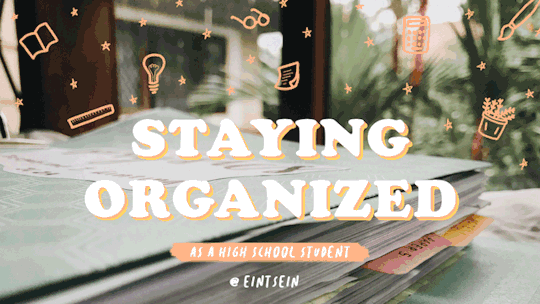
Hey guys, so I’m nearing the end of my senior year, and it’s been great so far! I accomplished my academic tasks efficiently and didn’t burn myself out, and I think the main contributor to my success as a student is my organization system. This system has been refined throughout my high school years, but I think now I’ve finally found the most effective methods.
Please remember that this isn’t the only organization system you can adopt; this is just the one that works the best for me, and I hope that by sharing it with you, you’ll gain a new perspective on how to stay organized as a high school student.

The first thing I wanna talk about is my notebook system, which I briefly mentioned in my Guide to Note-Taking.
My notebook system comprises three types of notebooks: the Everything Notebook, the subject notebook, and the revision notebook.
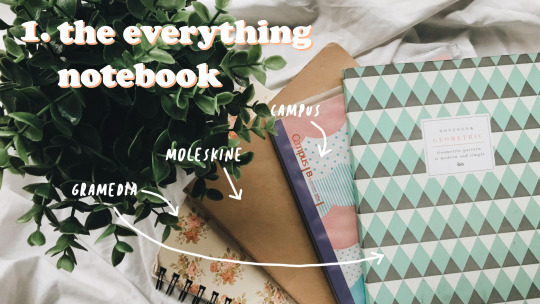
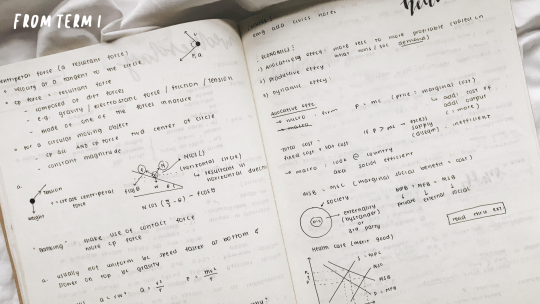
The Everything Notebook
The first stage is in-class notes. I only bring one notebook to school every day. I call it my Everything Notebook, and this is where I write down all of the notes I take in class. This way, I don’t have to lug around six notebooks where I’m only going to use a few pages in each of them that day.
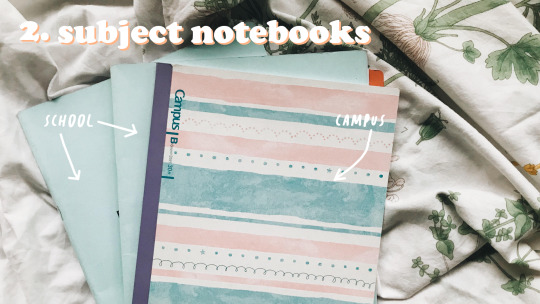
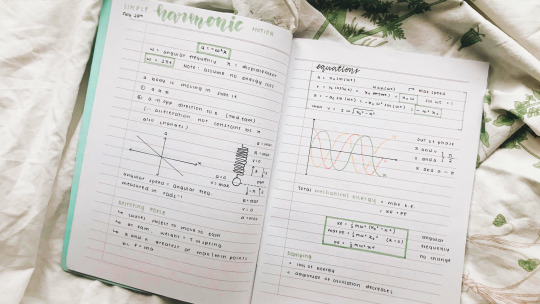
Subject Notebooks
At the end of the day, I would revise my notes and compare them to the syllabus so I know where we are in the learning process. I would then transfer my class notes from my Everything Notebook to my different subject notebooks. This is stage two. I also start to jazz up my notes because I use the notes in my subject notebooks to study for tests.
In addition to my class notes, I include material from my teachers’ notes that they might not have elaborated on, as well as points in the syllabus (I’m currently taking A2) that were only glazed over briefly, or not at all, in some cases. (Note: this does not mean they completely skip a chapter or topic; it’s more like they missed a few bullet points that should be in my notes but aren’t. An example would be if we’re learning about phenol reactions and the teacher forgot to mention the use of FeCl3 as a test for phenol.)
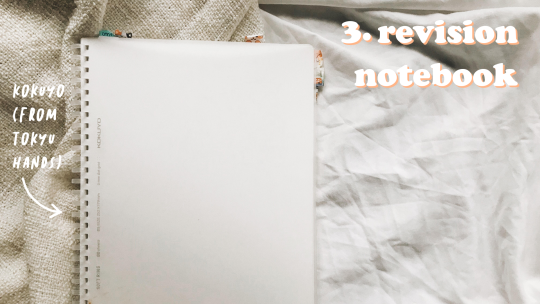
Revision Notebooks
Stage three comes a little later, when exam week is just around the corner. Essentially, I rewrite and improve my notes from my five different subject notebooks into a single revision notebook or binder. (Recently, I’ve opted for a revision notebook because they’re lighter and easier to carry around.)

Because my teachers don’t always teach in the order of the syllabus, the first thing I do is organize my notes according to the syllabus. I would then fill in any other missing gaps in the material that hadn’t been filled in stage two.
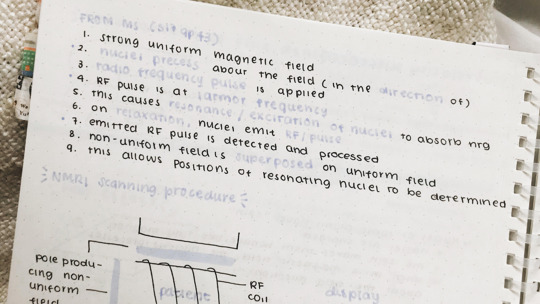
When compiling material for my revision notebook, I use as many sources as possible: my own notes, my teachers’ notes, youtube videos, online sites, and my favorite, the mark scheme! I add in some answers from past papers (explanations only, so no calculations) mainly to secure marks. It’s safer to memorize definitions straight from the mark scheme than from the textbook or from handouts. I also do this to ease my memorization, especially for topics that require lengthy explanations. It’s a lot easier to remember the 6 points I need to explain the principles of NMRI than to remember everything in the four-page handout my teacher gave me.

Folders and binders are essential to organizing your papers. Some people keep a single accordion folder for all their papers, but for me it’s just too heavy to carry around all the time. The same goes for subject folders that are brought to school every day.
Instead, my binder/folder system comprises my Everything Folder and my subject binders.
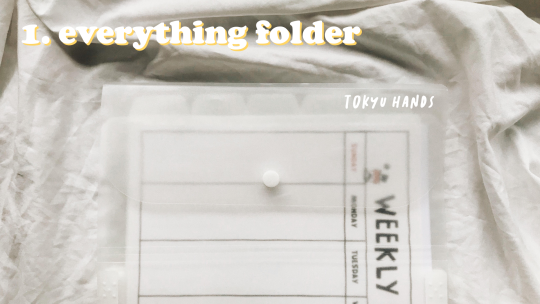
The Everything Folder
The folder I carry with me to school every day is this A4 folder I got from Tokyu Hands. It has 5 pockets, one for each day of the week, so all the papers I receive on Monday will go behind the first divider, and so on.
Some people also keep blank papers in their folders; I don’t because my school has its own lined paper and graphing pads that I keep under my desk that I use if a teacher asks us to do an assignment on those papers. If I do work at home, I prefer to just use a plain A4 paper or a legal pad.
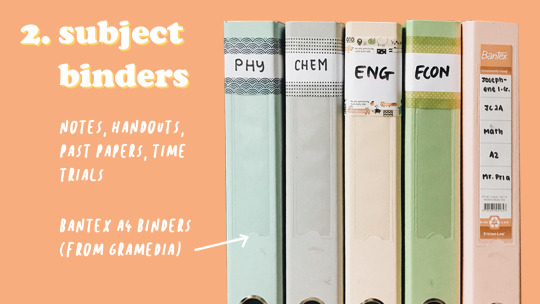
Subject Binders
At the end of the week, I’ll sort my papers into my subject binders. Sometimes I’ll keep some papers in the folder if I think I’ll be needing it the next week. This usually only applies to worksheets because all my teachers’ notes are available on Google Classroom, so I can access them even if I don’t physically have them.
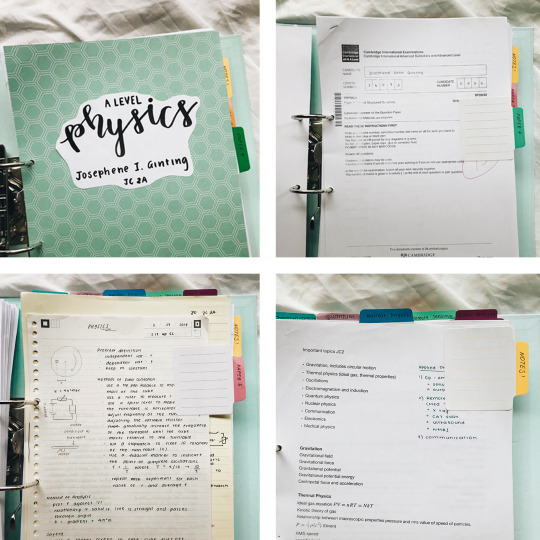
Each of these binders have sections inside them:
Physics: 1 for handouts, notes, and tests, 1 for Paper 4 (Theory), 1 for Paper 5 (Practical Planning). I included extra tabs to mark the different topics in the handouts section.
Chemistry: same as Physics.
Economics: 1 for Paper 3 (MCQ), 1 for Paper 4 (Case Study and Essay). A lot of my Economics material is online, though.
English: 1 for Paper 3 (Text and Discourse analysis), and 2 for Paper 4 (Language Topics, which includes 1 for Child Language Acquisition, 1 for World Englishes). Past papers, handouts, and notes all go under their respective topics.
Mathematics: I just keep everything together because I never revise math and just constantly do past papers.
This makes it easier for me to revise each subject because I can just take one binder with me instead of a messy folder with everything just shoved in there.

I keep a magazine file for each of my A-Level subjects (English and Mathematics are combined). All my textbooks, revision guides, and subject notebooks are kept here, so if I need to revise one subject, that’s the magazine file I’ll take out.
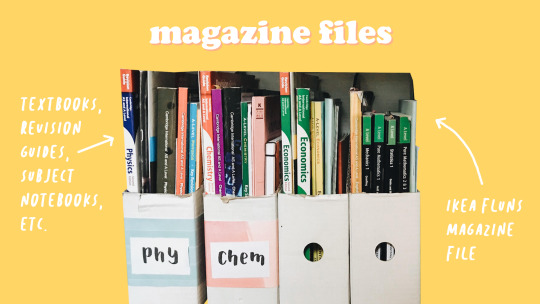
These magazine files prevent any small things (like my book of flashcards) from being shoved to the back of my bookshelf, or materials from different subjects from getting mixed up.

In my senior year, I mostly plan using this app called Edo Agenda. It syncs across all my devices for free and has all the features I need: a to do list to organize tasks, monthly and weekly calendars to organize events, a journal to organize notes and memos.

I used to bullet journal regularly, but it takes too much time during weekdays, so now I just bullet journal for the therapeutic effects it gives me, and I use an app for organizing tasks and events. Sometimes at the end of each week, I’ll transfer my tasks to my bullet journal and then decorate the page, but again, this is just for its therapy.

Organizing your school supplies is just as important as organizing your papers and notes. With a more organized backpack and pencil case, you won’t waste time looking for your things at the bottom of an abyss.
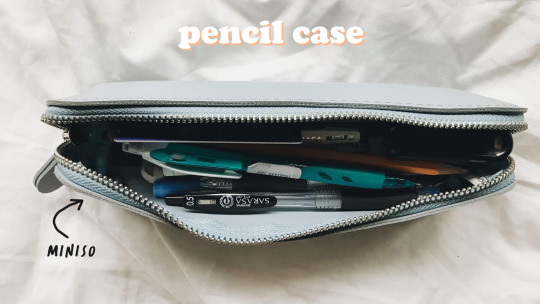
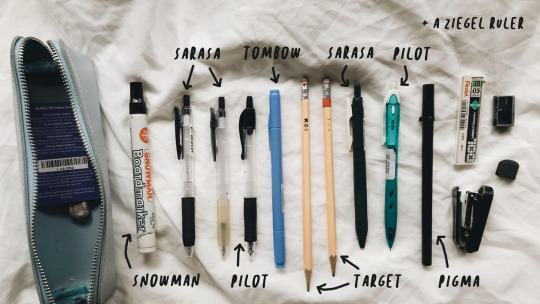
Pencil Case
I don’t find it necessary to bring so much stationery to school unless I plan on making notes at school (usually during revision week).
Backpack
Because we’re already in the revision term, I don’t really carry a lot of things in my everyday backpack, just the following:
Pencil case
Everything Notebook
Everything Folder
Revision notebook
Kindle
Phone
Wallet
Earphones
Calculator
Speaker
Drinking bottle
A pouch with things like a hairbrush, pads, and lip balm
And that’s all for now! I hope this post will help you organize your school life (if you haven’t already) or at least provide some useful insights on some ways to stay organized as a high school student.
45K notes
·
View notes
Text
things you need to hear this exam season
- don’t beat yourself up for struggling even if you’re doing your best - you are smart and capable so don’t let laziness stop you from achieving your potential - stop self sabotaging. that tv show can wait. take a break but don’t become your own obstacle to success. get shit done first - eating right, staying hydrated and sleeping well are non-negotiable. look after yourself - grades do not define you so be kind to yourself. but do your best and work hard for what you want
18K notes
·
View notes
Photo


hi guys!!! so this is my first picture thing i’ve done on this blog, and it’s about how to plan exam answers - this one is specifically about great expectations by charles dickens (english literature), but honestly, the tips could be used for literally any long-answer question. if you have any questions or queries, don’t hesitate to hit up my asks/ message me!! -hannah
#gcse#gcse english literature#studyblr#small studyblr#study blog#justjasminestudying#planning exam answers#exam answers#great expectations#charles dickens#english literature#gcse aqa#gcse aqa english literature#gcse aqa english lit#gcse english lit
4 notes
·
View notes
Text
site that you can type in the definition of a word and get the word
site for when you can only remember part of a word/its definition
site that gives you words that rhyme with a word
site that gives you synonyms and antonyms
1M notes
·
View notes
Note
hi!! i’m just gonna quickly (or not, as it turns out) add to this with things my english teacher has taught us:
for english literature (in aqa - not sure about the other exam boards - this applies for everything but unseen poetry) use PEACH, which is both cute and includes pretty much everything u need to say
P - point
E - evidence
A - analyse
C - context (gotta get those ao4 marks!!)
H - how it affects the reader
unseen poetry doesn’t use this structure because there’s no way of knowing the context of a poem if you’ve never seen it before!! so for this, you can use PEE or PEEL (or REEL!), or what my teacher taught us, which is essentially the same but it’s PETER:
P - point
E - evidence
T - technique/ terminology
E - explain
R - reader’s response
things like PEE/PEEL/REEL work best with english language and pretty much everything else (like science 6-markers)
but!! as good as these things are at helping you structure your essays, they are by no means unflawed. examiners are, particularly in english (but not so much in other subjects), looking at how fluently your response is written. so i prefer to use PEACH or whatever as a kind of checklist - mix it up, make sure it flows nicely without being too blocky and forced, but ensure you write about each point. fluency is a skill rather than something you can learn, so make sure you practice writing responses until writing becomes familiar rather than a task.
just another few things to throw in, specifically about english lit/lang:
- if you’re not using PEEL/REEL, make sure u link back to the question at some point !! it keeps you focused and prevents you from going off on a tangent
- plans do take up precious time but they’ve really helped me in the english lit mocks i’ve done!! there’s loads of different ways of writing them up, but i think i might make a post on how i do them. hmm
- for the love of all things holy, do NOT spout out long quotes in the middle of your essay!! not only do they make the whole thing clunky to read, but they’re difficult to learn too. it’s much better to include little quotes imbedded in your sentence (only a few words at a time) because it helps your answer flow and shows skill rather than just a good memory ;)
i hope that was helpful!! aha
Have you got any useful mnemonics for English language paper 1 section A and B?
i’m assuming you mean how to answer the questions?
writing a report: REELReasonEvidence, such as statistics Explanation- why and how are the stats important? explain ur pointLink back to question
when you get any writing task, you should always identify PAF:PurposeAudience Form it will help you put things into perspective and get you Focussed!
yh that’s it tbhif you have any other ones, please do let me know!
(also sorry if these aren’t for the right paper)
10 notes
·
View notes
Text
How To Do Really Well at GCSE
Disclaimer: This is not sugar-coated because I don’t see the point when I know grades can seem like LIFE OR DEATH
Be prepared to work hard and miss doing the things you love for a while.I missed out on some TV that other people were watching, but still rewarded myself with what I really wanted- HOLBY CITY FOR LYFE
Breaks are important or you will not work effectively- unless you’re one of those people who can work for 3 consecutive hours without stopping you have to take breaks. Try it out and if you can’t concentrate, don’t push yourself. Giving yourself breaks allows you to work better later on.
If you don’t start working early, you won’t excel. Sorry kids. I am good at schoolwork and exams, but there is NEIN way I could have performed as well as I did without prep beforehand e.g. Science I haven’t performed particularly well because I mostly just crammed.
English Literature- do practice questions. MAKE ESSAY PLANS. I did Romeo and Juliet, Great Expectations, the Power and Conflict section of the Poetry Anthology (WJEC) and The History Boys, and the essay plans saved my life. Turn in the essays to your teacher to be marked. Did this for History Boys and helped me get 12/12 for AO2 language and structure, which I’d been struggling on. You have to address things you find difficult or you won’t excel.
It’s okay if an exam is incredibly hard. The AQA French Listening was ridiculous. After it was over I started crying. My French teacher cried. The French teacher’s daughter, who was predicted an A* like me, was very, very worried. But the paper was recognised as absurdly difficult and the grade boundaries were lowered. If you put the work in and concentrate on the day, you should be able to do as well as you want to.
Turn up to your exams when you want to. People say that you should be really early, but this just didn’t work for me. If I was really early, I’d be surrounded by nervous people (this is not constructive) and I’d get claustrophobic in the area outside the exam room before we were allowed to go in. If you’re late and there are only a few minutes until the exam starts, you get nervous palpitations, there’s a risk of being late and you get little time to compose yourself. I personally liked to arrive when there were a few people sat in the exam room and people were slowly dripping in, with around 10 minutes until the start of reading the regulations. This gave me enough time to get my shizz together whilst not having to be around nervous people, as you just say ‘good luck’ to whoever you walked down with and then get in there.
Make use of your study leave, but don’t overload. I live within 20 minutes walking distance from my secondary school so I just went along to revise history there when I wanted to. If you live further away revision at home is probably better but try to attend revision sessions that your teachers put on during the day or after the normal school day eg. I went in to use an empty history classroom the day before my second history exam, went home for a late lunch, chilled for an hour and then headed back to school for 3.10pm for the after-school revision time. Helped boost my confidence that I knew my topics inside out, since it was content based and not technique based, the latter of which I strongly believe takes time to develop and if you don’t have it the night before, you are fucked.
Put time into your coursework across the subjects you have it in. I had it in History, Drama, Geography, Science and French, and they made me feel much more confident about my final grade. Aware that with 9-1 grading (I only had it for English and Maths lol) there is much less coursework… still, please put the effort in. A boy in my year physically cannot pass science because he didn’t do his coursework, which was worth 25% of our science GCSE. For the A* achievers, coursework bumps up your grade and if you get high marks you’re likely to get a high grade, since we know you’ll do well in exams.
Take care of hygiene etc- if you look and feel clean you’ll work better and untangle yourself from your duvet. Don’t learn in your duvet, learn at your desk. Please.
Same goes for exams. If you don’t have short hair, put it up. So many girls kept pushing it out of their eyes and flipping it, not to mention their fringes. It wastes time in an exam and makes it hard to concentrate- I can’t concentrate with hot hair on the back of my neck. Forgot to put my hair up before the first maths exam and it was my worst one, so please don’t be me. I wore my hair up in a bun for every other exam and I think it allowed me to concentrate better. Take water. Even though drinking takes a little bit of time, smart people like you and me know that it’s better not to die of dehydration when you’re trying to get an A*. Take a drink when you need to- you won’t feel dizzy. Take a pretty coloured bottle if you’ve got one- they’re comforting. Have a pen and a few spares. It’s basic but SO many people forgot… I don’t think I had a single exam where there wasn’t someone who needed to borrow a pen. Feeling prepared with stationery makes you feel more prepared for the questions and that you’ve learned everything. AND FOR THE LOVE OF GOD, IF YOU ARE HOT, TAKE OFF YOUR BLAZER/ SCHOOL CARDIGAN. SO MANY GIRLS REFUSED BECAUSE OF THE OUTLINE OF THEIR BRAS THROUGH THEIR SHIRTS… GURL ARE YOU FOR CEREAL? WHO GIVES A CRAP? NO-ONE IS LOOKING IN AN EXAM… EVERYONE’S CRYING OVER THEIR OWN PAPER! AND IF ANYONE IS STARING, THEY’RE GOING TO FAIL, AND YOU’RE NOT! My point is, be comfortable. Please.
Sleep well and wake up early. I always did bits of revision in the morning because I hated doing nothing except snapchatting my friends and re-assuring them that they weren’t going to fail. We should all know that all-nighters are a no-no. Smart people should prep in advance so that all-nighters are not even considered. I never did.
Learn how to write quickly/neatly and make sure your SPAG is en-pointe. If your answers are relatively neat, examiners are WAAY more obliged to give you good marks, as they won’t have to look so hard for them. Its fine if your papers are a bit messy though- you should be focusing on what you get down rather than how it looks. Shitty examiners should not be the reasons why you don’t get that grade- give them NO excuse to grade you down. Make it so clear that you understand the question and are very capable of answering it so that they physically have no excuse to mark you down.
Don’t feel like you have to do things you find unnecessary e.g. if there’s a session on something you’re really confident on, don’t go. Just do a few questions to confirm that you’re good. Plus, use lessons that you don’t need to fill the gaps in your own knowledge. Just tell your teacher first. If you don’t use mindmaps but that’s what the teacher is asking the class to do, explain that you do it a different way and offer to show them if they’re not convinced. If you’re a capable, responsible student then they’ll probably let you.
If there’s something that you really don’t get, dedicate some time to it. If it’s on the specification, it’ll probably be on the paper in some form, so don’t miss it out. Marks are marks. Even if you only get 2/6 on the science 6 marker, it adds up (probably me on the P2 paper ;/)
Feel free to shoot me any questions btw!!
180 notes
·
View notes
Text
Alternatives for 25 overused words in writing
1. Interesting- note worthy; thought-provoking; fascinating; attracting; appealing; attention-grabbing; captivating; gripping; invigorating; engrossing; engaging; electrifying.
2. Beautiful- striking; stunning; magnificent; lovely; charming; gorgeous; radiant; dazzling.
3. Good- acceptable, wonderful, exceptional; positive; brilliant; first-rate; notable; stellar; favorable; superb; marvellous; prime.
4. Bad- awful; lousy; poor; unacceptable; crummy; dreadful; rough; inferior; substandard; atrocious; appalling; dreadful; defective.
5. Look- glance; fixate; observe; stare; gaze; peer; scan; watch; study; browse; eye; glimpse; review; inspect.
6. Nice- lovely; superior; pleasant; satisfying; delightful; likeable; agreeable; correct; adequate; swell; fair; okay; approved.
7. Very- extremely; exceedingly; exceptionally; immensely; tremendously; abundantly; particularly; remarkably.
8. Fine- satisfactory; worthy; respectable; exquisite; suitable; well; imposing; decent; admirable; praise-worthy; decent.
9. Happy- cheerful; delighted; pleased; content; amused; thrilled; elated; thrilled; ecstatic; on cloud 9.
10. Really- genuinely; truly; honestly; actually; undoubtedly; certainly; remarkably; incredibly; downright; unquestionably; extremely.
11. Sad- miserable; gloomy; devastated; down at heard; distraught; distressed; dispirited; sorrowful; downcast; feeling blue; desolate.
12. Big- massive; huge; giant; gigantic; enormous; large; colossal; immense; bulky; tremendous; hefty; sizable; extensive; great; substantial.
13. Shocked- taken aback; lost for words; flabbergasted; staggered; outraged; astonished; astounded; stunned; speechless; appalled.
14. Small- tiny; petite; mini; miniature; microscopic; minuscule; compact; pocket-sized; cramped; puny; undersized; limited; meager; modest; minute; pint-sized.
15. Angry- irate; enraged; touchy; cross; resentful; indignant; infuriated; wound-up; worked-up; seething; raging; heated; bitter; bad-tempered; offended; frustrated.
16. Know- understand; comprehend; realize; learn; perceive; recognize; grasp; sense.
17. Change- alter; transform; replace; diversify; adjust; adapt; modify; remodel; vary; evolve; transfigure; redesign; refashion; advance; transition; shift; adjustment.
18. Old- aged; ancient; matured; elderly; senior; veteran; decrepit; seasoned; venerable; past one’s prime; doddering; senile.
19. Think- ponder; reflect; conceive; imagine; contemplate; consider; determine; realize; visualize; guess/assume; conclude; envision.
20. Funny- comical; ludicrous; amusing; droll; entertaining; absurd; hilarious; silly; whimsical; hysterical; joking; witty; facetious; slapstick; side-splitting; knee-slapping.
21. Go- move; proceed; advance; progress; travel; walk; journey; depart; exit; flee; make one’s way; clear out; get underway.
22. Give- grant; donate; hand-out; present; provide; deliver; hand over; offer; award; bestow; supply with; contribute to; send; entrust.
23. Get- acquire; obtain; receive; gain; earn; gather; collect; buy; purchase; attain; score; secure; take possession of; grab.
24. Easy- effortless; simple; clear; smooth; straightforward; uncomplicated; painless; accessible; apparent; basic; plain; child’s play; facile; elementary; cinch.
25. Fast- agile; brisk; rapid; nimble; swift; accelerated; fleeting; high-speed; active; dashing; winged; hurried; turbo.
133K notes
·
View notes
Text
Back to School: How to Get an A*/8 or 9 in an English Lit Essay!

Happy September, everyone!
As we all get our gears in motion to start a new year, I thought I would share my top tips for scoring the highest marks in English Literature essays.
(P.S. Lots of these tips are applicable to other subjects too)
1. Don’t write about the character as if they are real
Unfortunately, this is a common error in English Lit essays. It is absolutely imperative to remember that a character is not a person, but is a construct of the writer in order to present an idea or theme. No matter the question, you should be linking your answer back to the writer’s ideas and theme of the text, even if it doesn’t seem obvious what the theme is on the first inspection of the question. Using the author’s name frequently in your essay will demonstrate that you recognise the character is not a real person - ‘Shakespeare portrays Macbeth as a tragic hero, as defined by Aristotle as…’
2. Don’t analyse the plot
Avoid analysing the plot or when things happen in the text. Don’t write ‘When X happens it makes us think Y’. Instead:
Analyse the writer’s use of language, structure and form to create meaning
Do a close language analysis of specific words/phrases, including a sound analysis (plosives, assonance, etc.)
Do a structural analysis of what happens when and why that’s important (Freytag’s pyramid)
Do an analysis of form (stage directions, dramatic monologue, etc.)
3. Keep your answer relevant throughout
You need to be explicitly answering the question - not going off on a tangent nor trying to change the question to suit an answer that you want to write. One way of avoiding this is by starting each paragraph with a topic sentence, summarising what that paragraph is going to be about and how it answers the question. Another method is simply by rewording the question into your answer at the start and end of every paragraph. At least. For greater impact, include synonyms of the word, which can also help with the readability of your answer.
4. Avoid PEE/PEEL/etc. where you can
Thousands of students are taught the same, basic Point-Evidence-Explain (or variant) analytical paragraph structure. If you want to stand out, show academic strength, and achieve the highest marks then you must break free from the chains of PEE! (This also applies for your introduction format. ‘In this essay, I will argue…’ gets pretty dull after reading it 100 times)
For my students, I will be teaching them to write What-How-Why paragraphs:
WHAT has the writer done?
HOW have they done it?
WHY have they done it/is it effective?
This way, your focus is always on why the writer has chosen to use that specific language/structure/form, but it allows you to be creative in crafting your response. Being able to discuss the ‘why’ of literature is the key to unlocking the highest grades. Reading through examiners’ reports this summer has made one thing clear - it is not enough to merely spot linguistic devices or structural features. You must explain why the writer has chosen them and why that is an effective choice (or not).
5. Avoid sweeping statements about context
The main advice here is to only include comments about the context of the text if it adds to the analytical point that you are making. They should not be a bolt-on sentence, but they should enhance your answer.
Further, sweeping claims like ‘All Jacobean women were oppressed by society’ is far too vague. On the other hand, a comment like ‘Lady Macbeth is a disturbing example of womanhood because she denies her gender at a time where the role of a woman was clear-cut, even patriarchal, in Jacobean society’ suggests that you have a greater understanding of how context can influence the writer’s choices.
6. A plan is your best friend
Always, always make time to plan your answer. A method I recommend is, first, circling the key words in the question (character/theme, what you are asked to do, where in the text you are asked to look, etc.). Secondly, write all of your ideas down onto the page, highlighting parts from the extract if you have that in front of you. Finally, select a judicious number of points that you are going to talk about (quality not quantity here) and number the order in which you are going to make them.
If you are writing a comparative essay, each paragraph must start and end with a comparative point about whatever it is you are comparing (characters/themes/etc.) I suggest the following format:
‘X is presented in both text A and text B. However, in A the author uses device 1 and 2 to demonstrate X. On the other hand, in B, the author demonstrates X via use of device 2 and 3.’ Then write one paragraph for each text. Repeat this again for another similarity. And again for a third - if you think that is appropriate.
Photo credit @eintsein 🌻
12K notes
·
View notes
Text
Cozy vocab in Spanish

based on @malteseboy‘s cozy vocab in maltese post
el beso – kiss la película – movie mimos, arrumacos – cuddles el suéter – sweater la almohada – pillow el café – coffee los calcetines – socks el libro – book la comodidad – comfort la manta – blanket la siesta – nap la chimenea, el hogar – fireplace el gato – cat el calor – warmth las estrellas – stars el té – tea el abrazo – hug la vela – candle la lluvia – rain la nieve – snow
suave – soft delicado/a – delicate dulce – sweet cómodo/a – comfortable cálido/a, caliente - warm calentito/a - cozy, toasty
besar – to kiss abrazar – to hug cuidar de (alguien) – to take care (of smb.) acostar(se) – to lie down acurrucarse – to cuddle leer – to read dormir – to sleep descansar – to rest
Other cozy vocab lists: Maltese, Finnish, Polish, Hebrew, German, Russian, Hungarian, Swedish, Italian, Lithuanian, Japanese
771 notes
·
View notes
Text
REBLOG and follow me if you’re a uk studyblr or any studyblr actually and I’ll follow you back yessss
165 notes
·
View notes
Text
wow i cant wait to have my own apartment n come running down the hallway to my door in my heels after a long day at work and opening my door and hearing the sound of my keys hitting the counter and looking at what mail arrived that day and then going to the bathroom and taking care of myself and applying lotions to my entire body n applying face masks and listening to the way you look tonight by frank sinatra on vinyl n dancing around slowly while wearing nothing but my cute lace bra & undies n a dark red silky lace robe that i havent even wrapped around my body yet and makin myself a snack. i cant wait to get to that.
69K notes
·
View notes
Text
how to avoid education burnout
have 3 achievable goals a day: having a laundry list of things to do everyday is super unrealistic, and you just end up feeling bad about yourself because you didn’t accomplish your goals for the day.
leave your sundays open: i love sundays because they’re my day to chill out and catch up on school work that i wasn’t able to finish during the week.
recognize when you’re at your emotional limits: forcing yourself to get work done when you are unable to comprehend your study material does not benefit anyone.
learn how to say no: people will ask you for your time and it will stretch you to the limit, whether it be at your job, in your extracurriculars, or in your personal life. know when to step back and say no.
take care of yourself physically: take breaks, go for walks, shower regularly, get enough sleep, eat healthy, see your friends
celebrate your accomplishments: go out to eat with friends after a big exam, indulge in a night off after a busy week with some netflix and wine
make a study plan beforehand: it can be daunting to see how much work you need to put in to a class or task beforehand, but this allows you to spread your work evenly so you don’t become overwhelmed.
learn how to ask for help: it is very rare that people make it through school, whether it be high school or university or any graduate program, without needing the advice of others or just a kind soul to vent to. find that person.
never forget your hobbies: you will need things that keep you sane. if you love to play music, write, play volleyball, or cook, make you sure you don’t lose these things. they will become your escape when times get tough.
log off from time to time: it is exhausting to be constantly connected to social media and your email. just physically disconnecting from these for a night to take care of yourself can really help you clear your mind.
71K notes
·
View notes